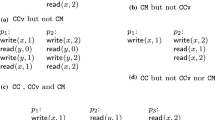Abstract
MongoDB is one of the first commercial distributed databases that support causal consistency. Its implementation of causal consistency combines several research ideas for achieving scalability, fault tolerance, and security. Given its inherent complexity, a natural question arises: “Has MongoDB correctly implemented causal consistency as it claimed?” To address this concern, the Jepsen team has conducted black-box testing of MongoDB. However, this Jepsen testing has several drawbacks in terms of specification, test case generation, implementation of causal consistency checking algorithms, and testing scenarios, which undermine the credibility of its reports. In this work, we propose a more thorough design of Jepsen testing of causal consistency of MongoDB. Specifically, we fully implement the causal consistency checking algorithms proposed by Bouajjani et al. and test MongoDB against three well-known variants of causal consistency, namely CC, CCv, and CM, under various scenarios including node failures, data movement, and network partitions. In addition, we develop formal specifications of causal consistency and their checking algorithms in TLA+, and verify them using the TLC model checker. We also explain how TLA+ specification can be related to Jepsen testing.
Similar content being viewed by others
References
Schultz W, Avitabile T, Cabral A. Tunable consistency in MongoDB. Proc. VLDB Endow., 2019, 12(12): 2071-2081. https://doi.org/10.14778/3352063.3352125.
Tyulenev M, Schwerin A, Kamsky A, Tan R, Cabral A, Mulrow J. Implementation of cluster-wide logical clock and causal consistency in MongoDB. In Proc. the 2019 International Conference on Management of Data, June 30-July 5, 2019, pp.636-650. https://doi.org/10.1145/3299869.3314049.
Abadi D. Consistency tradeoffs in modern distributed database system design: CAP is only part of the story. IEEE Computer, 2012, 45(2): 37-42. https://doi.org/10.1109/MC.2012.33.
Brewer E A. Towards robust distributed systems (abstract). In Proc. the 19th Annual ACM Symposium on Principles of Distributed Computing, July 2000, Article No. 7. https://doi.org/10.1145/343477.343502.
Gilbert S, Lynch N. Brewer’s conjecture and the feasibility of consistent, available, partition-tolerant web services. ACM SIGACT News, 2002, 33(2): 51-59. https://doi.org/10.1145/564585.564601.
Brzezinski J, Sobaniec C, Wawrzyniak D. From session causality to causal consistency. In Proc. the 12th Euromicro Conference on Parallel, Distributed and Network-Based Processing, Feb. 2004, pp.152-158. https://doi.org/10.1109/EM-PDP.2004.1271440.
Kulkarni S S, Demirbas M, Madappa D, Avva B, Leone M. Logical physical clocks. In Proc. the 18th International Conference on Principles of Distributed Systems, Dec. 2014, pp.17-32. https://doi.org/10.1007/978-3-319-14472-6_2.
Du J, Iorgulescu C, Roy A, Zwaenepoel W. GentleRain: Cheap and scalable causal consistency with physical clocks. In Proc. the ACM Symposium on Cloud Computing, Nov. 2014, Article No. 4. https://doi.org/10.1145/2670979.2670983.
Akkoorath D D, Tomsic A Z, Bravo M, Li Z, Crain T, Bieniusa A, Preguiça N, Shapiro M. Cure: Strong semantics meets high availability and low latency. In Proc. the 36th International Conference on Distributed Computing Systems, June 2016, pp.405-414. https://doi.org/10.1109/ICDCS.2016.98.
Ongaro D, Ousterhout J. In search of an understandable consensus algorithm. In Proc. the 2014 USENIX Conference on USENIX Annual Technical Conference, June 2014, pp.305-320.
Bouajjani A, Enea C, Guerraoui R, Hamza J. On verifying causal consistency. In Proc. the 44th ACM Symposium on Principles of Programming Languages, Jan. 2017, pp.626-638. https://doi.org/10.1145/3009837.3009888.
Burckhardt S. Principles of eventual consistency. Found. Trends Program. Lang., 2014, 1(1/2): 1-150. https://doi.org/10.1561/2500000011.
Perrin M, Mostéfaoui A, Jard C. Causal consistency: Beyond memory. In Proc. the 21st ACM Symposium on Principles and Practice of Parallel Programming, Aug. 2016, Article No. 26. https://doi.org/10.1145/2851141.2851170.
Ahamad M, Neiger G, Burns J E, Kohli P, Hutto P W. Causal memory: Definitions, implementation, and programming. Distributed Computing, 1995, 9(1): 37-49. https://doi.org/10.1007/BF01784241.
Lynch N A. Distributed Algorithms. Morgan Kaufmann Publishers Inc., 1996.
Ouyang H R, Wei H F, Huang Y. Checking causal consistency of MongoDB. In Proc. the 12th Asia-Pacific Symposium on Internetware, Nov. 2020, pp.209-216. https://doi.org/10.1145/3457913.3457928.
Lamport L. Time, clocks, and the ordering of events in a distributed system. Commun. ACM, 1978, 21(7): 558-565. https://doi.org/10.1145/359545.359563.
Lesani M, Bell C J, Chlipala A. Chapar: Certified causally consistent distributed key-value stores. In Proc. the 43rd Annual ACM SIGPLAN-SIGACT Symposium on Principles of Programming Languages, Jan. 2016, pp.357-370. https://doi.org/10.1145/2837614.2837622.
Lamport L. Specifying Systems: The TLA+ Language and Tools for Hardware and Software Engineers (1st edition). Addison-Wesley Professional, 2002.
Lamport L. The temporal logic of actions. ACM Trans. Program. Lang. Syst., 1994, 16(3): 872-923. https://doi.org/10.1145/177492.177726.
Wei H F, Tang R Z, Huang Y, Lv J. Jupiter made abstract, and then refined. Journal of Computer Science and Technology, 2020, 35(6): 1343-1364. https://doi.org/10.1007/s11390-020-0516-0.
Yu Y, Manolios P, Lamport L. Model checking TLA+ specifications. In Proc. the 10th IFIP WG 10.5 Advanced Research Working Conference on Correct Hardware Design and Verification Methods, Sept. 1999, pp.54-66. https://doi.org/10.1007/3-540-48153-2_6.
Cooper B F, Silberstein A, Tam E, Ramakrishnan R, Sears R. Benchmarking cloud serving systems with YCSB. In Proc. the 1st ACM Symposium on Cloud Computing, June 2010, pp.143-154. https://doi.org/10.1145/1807128.1807152.
Bowles J, Caminati M B. A verified algorithm enumerating event structures. In Proc. the 10th International Conference on Intelligent Computer Mathematics, July 2017, pp.239-254. https://doi.org/10.1007/978-3-319-62075-6_17.
Gibbons P, Korach E. Testing shared memories. SIAM Journal on Computing, 1997, 26(4): 1208-1244. https://doi.org/10.1137/S0097539794279614.
Herlihy M P, Wing J M. Linearizability: A correctness condition for concurrent objects. ACM Trans. Program. Lang. Syst., 1990, 12(3): 463-492. https://doi.org/10.1145/78969.78972.
Attiya H, Welch J L. Sequential consistency versus linearizability. ACM Trans. Comput. Syst., 1994, 12(2): 91-122. https://doi.org/10.1145/176575.176576.
Wei H, Huang Y, Cao J, Ma X, Lv J. Verifying Pipelined-RAM consistency over read/write traces of data replicas. IEEE Transactions on Parallel and Distributed Systems, 2013, 27(5): 1511-1523. https://doi.org/10.1109/TPDS.2015.2453985.
Lipton R J, Sandberg J. PRAM: A scalable shared memory. Technical Report, Department of Computer Science, Princeton University, 1988. https://www.cs.prince-ton.edu/research/techreps/TR-180-88, Aug. 2021.
Author information
Authors and Affiliations
Corresponding authors
Additional information
Heng-Feng Wei and Hai-Xiang Li have contributed significantly to the theoretical and experimental parts of the work, respectively.
Supplementary Information
ESM 1
(PDF 810 kb)
Rights and permissions
About this article
Cite this article
Ouyang, HR., Wei, HF., Li, HX. et al. Checking Causal Consistency of MongoDB. J. Comput. Sci. Technol. 37, 128–146 (2022). https://doi.org/10.1007/s11390-021-1662-8
Received:
Accepted:
Published:
Issue Date:
DOI: https://doi.org/10.1007/s11390-021-1662-8




